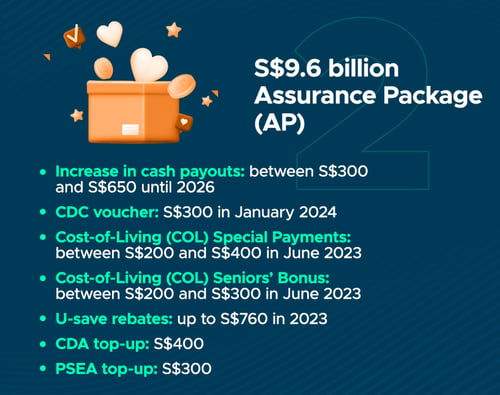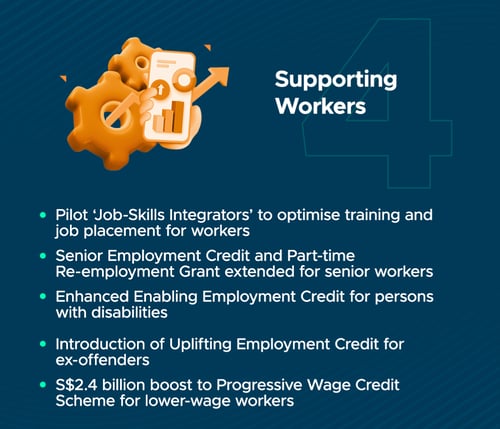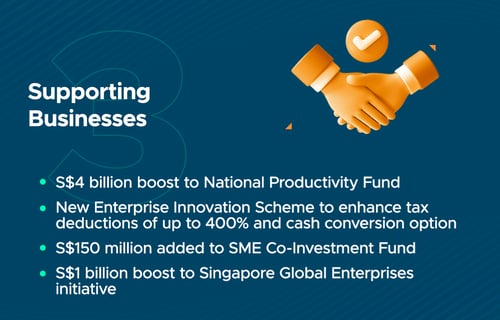Now that we’re in an endemic, how will Budget 2023 continue to address inflation, business challenges, and employment issues in the coming year?
Amid economic shocks of war, record-high inflation, and continuously-rising costs of living, all the financial stressors in life just keep piling up. Meanwhile, the rise in major tech firm layoffs saw businesses struggling to remain competitive and a spike in unemployment.
This is why when Budget 2023’s theme, “Moving Forward in a New Era”, was announced, everyone was eager to hear how this year’s Budget measures would be different compared to previous years, now that we’re in an endemic phase.
Other higher property and vehicle taxes, increased government grants, more GST vouchers, and greater community support being unveiled in yesterday’s Budget talk, what else has been addressed on a global and national front for businesses and employees?
Here’s what Deputy Prime Minister and Finance Minister Lawrence Wong had to say.
Table of contents
Inflation
Additional S$300 to S$650 top-up to Assurance Package

Besides the perennially-popular GST vouchers, the Assurance Package is another crowd favourite ever since it was first unveiled during Budget 2020.
Following the recent S$1.4 billion boost to the Assurance Package back in November 2022, the government has now topped up S$1.6 billion extra to the Package, bringing its total to a whopping S$9.6 billion in value.
So what does this mean?
Package payouts are being increased by another S$300 to S$650 for eligible Singaporeans over the remaining years of the Assurance Package, until 2026.
Together with more CDC vouchers, U-Save rebates, and cost-of-living special payments being distributed, we can all thank DPM Lawrence Wong for sponsoring our grocery hauls and dine-outs for the next month or so. 😋
This brings the total Assurance Package cash payouts to between S$700 and S$2,250 for all eligible Singaporeans adults, aged 21 and above.
For individuals / employees
Now for working adults, what can we take away from Budget 2023?

New ‘Job-Skills Integrators’ initiative
Sighting the recent unemployment trends of many tech giant layoffs in 2022, the government recognised the need to support individuals in upskilling themselves and remaining employable.
See also: 6 SkillsFuture Courses Worth Spending Your Credits On
A gap in labour market intermediaries was identified, explaining why many job-seekers lacked proper training and job placements.
In response, this gap spawned a new initiative called the ‘Job-Skills Integrators’. These intermediaries are appointed to work with industry, training and employment facilitation partners to assist in the following fields:
- Engage enterprises to understand the manpower and skills gap in each sector.
- Work with training providers to update existing training programmes and create new ones.
- Collaborate with employment facilitation agencies, get buy-in from industry partners and unions, and identify competent job-seekers.
The scheme will be piloted in the precision engineering, retail and wholesale trade sectors first since there are more mature workers and SMEs prevalent in those sectors.
S$2.4 billion top-up to Progressive Wage Credit Scheme
To close up socio-economic disparities in Singapore’s workforce, the government has chosen to top up an additional S$2.4 billion to the Progressive Wage Credit Scheme. The government will continue to co-fund up to 75% of wage increases for employees earning less than S$2,500 per month.
Previously announced in Budget 2022, this scheme aims to offer more transitional support to both businesses and the bottom 20% of income earners.
Extension of employment support for seniors
And of course, notwithstanding Singapore’s rapidly ageing population, the Senior Employment Credit and Part-time Re-employment Grant have been extended to 2025.
Under the former, employers will receive wage offsets for new senior hires (aged 55 and above) earning up to S$4,000 per month. Under the latter, employers are encouraged to hire seniors for part-time re-employment stints and flexi-work arrangements.
Read more:
The Best Countries to Work Remotely on a Budget
Considering a Career Switch? 4 In-Demand Jobs in a Post-Pandemic World
For Businesses
Now, if you’re an aspiring entrepreneur or business owner, listen up. The Budget focus has now shifted from pandemic-related emergency spend to facilitating SME growth as much as possible.

S$4 billion top-up to National Productivity Fund
Analysts foresee China’s reopening and the West easing their aggressive monetary policy tightening as positive signs of global economic growth. Although fears of a potential recession seemed imminent at one point, the chief economist of the International Monetary Fund (IMF) thinks this risk has tapered out.
From Singapore’s standpoint, the government is taking full advantage of internationalisation opportunities by topping up S$4 billion to National Productivity Fund to attract more foreign investments.
This fund will support grants to companies under productivity investments, training, and further education, and has since expanded to investment promotion as well.
All in all, this additional fund endeavours to help upskill workers and create better-paying jobs for Singaporeans.
Up to 400% tax deductions under Enterprise Innovation Scheme
Behold, the government has introduced another new scheme to attract foreign investors into our commercial hub.
The Enterprise Innovation Scheme aims to enhance tax deductions of up to 400% for key innovation activities. This is a major 150% increase from the previous 250% tax deductions in place. The expenditures are capped at S$400,000 for each activity, with an exception of S$50,000 only for polytechnics and ITE.
The tax deductions will affect the following activities:
- Research and Development conducted in Singapore
- Registration of Intellectual Property (IP), including patents, trademarks, and designs
- Acquisition and licensing of IP Rights
- Innovation research done in polytechnics and ITE
- Training via SkillsFuture courses
So yes, that means Singaporeans can potentially file for higher income tax relief as both individuals and businesses!
Read more:
Best SME Business Loans in Singapore
5 Key Reasons Why Successful SMEs Take Business Loans
Up to S$20,000 cash payouts for struggling businesses
Unprofitable firms will have the option of converting 20% of their total qualifying annual expenditure into a cash payout of up to S$20,000. These payouts are meant to support businesses waiting to turn profitable or lack sufficient profits to maximise tax deduction benefits.
Basically, SMEs will be able to focus on R&D efforts without worrying about taxes.
S$150 million top-up to SME Co-Investment Fund
Speaking of SMEs, they’re also receiving another layer of support from the additional S$150 million top-up to the SME Co-Investment Fund. A further S$300 million worth of private investments will also be set aside for them.
S$1 billion top-up to Singapore Global Enterprise Initiative
But who says SMEs get all the love? Larger Singapore companies need not fear getting neglected because the government has pumped in S$1 billion to the Singapore Global Enterprise Initiative.
This scheme provides customised assistance to larger firms in need of expert guidance and growth strategy plans.
Looking for the best credit cards to complement your spending patterns and expenditure in 2025? Check out our Ultimate Credit Card Guide that covers all things credit cards in Singapore – from choosing between a cashback, miles, or rewards credit card to planning your credit card strategy.
Read these next:
Singapore Budget 2023 Live Coverage: Key Highlights
Singapore Budget 2023: All the CPF-related Changes to Know
Singapore Budget 2023: GST Vouchers & Household Support Guide
Singapore Budget 2023: Higher HDB Grants, Stamp Duties, and ARF Rates
Similar articles
How Singapore Budget 2020 Affects HDB, CPF & Living Costs
Singapore Budget 2023 - All the CPF-related Changes To Know
Resilience & Solidarity Budget To Tide You Over COVID-19 Circuit Breaker
Singapore Rolls Out S$1.5 Billion Support Package To Help Lower-Income & Vulnerable Families Cope With Inflation
Singapore Budget 2023 Live Coverage: Key Highlights
Guide to SME Grants and COVID-19 Measures to Support Businesses in Singapore
Jobs Growth Incentive (JGI) – The Complete Guide (2022)
6 Things To Know About Jobs Support Scheme (JSS)









